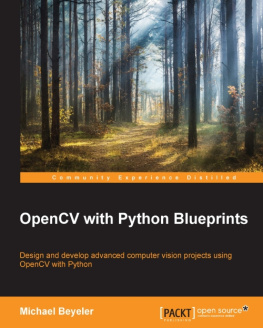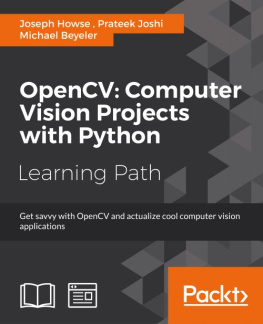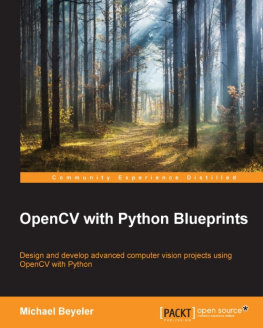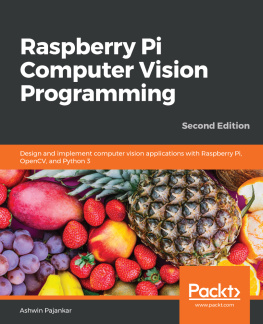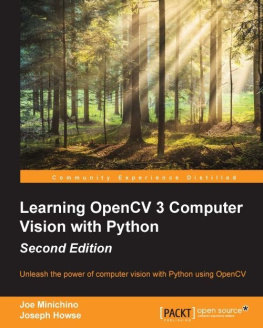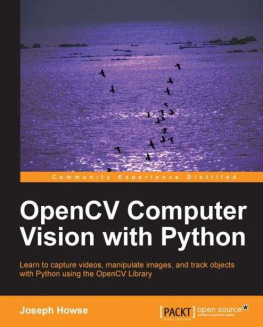Michael Beyeler - OpenCV with Python Blueprints
Here you can read online Michael Beyeler - OpenCV with Python Blueprints full text of the book (entire story) in english for free. Download pdf and epub, get meaning, cover and reviews about this ebook. year: 2015, publisher: Packt Publishing, genre: Computer. Description of the work, (preface) as well as reviews are available. Best literature library LitArk.com created for fans of good reading and offers a wide selection of genres:
Romance novel
Science fiction
Adventure
Detective
Science
History
Home and family
Prose
Art
Politics
Computer
Non-fiction
Religion
Business
Children
Humor
Choose a favorite category and find really read worthwhile books. Enjoy immersion in the world of imagination, feel the emotions of the characters or learn something new for yourself, make an fascinating discovery.
- Book:OpenCV with Python Blueprints
- Author:
- Publisher:Packt Publishing
- Genre:
- Year:2015
- Rating:4 / 5
- Favourites:Add to favourites
- Your mark:
OpenCV with Python Blueprints: summary, description and annotation
We offer to read an annotation, description, summary or preface (depends on what the author of the book "OpenCV with Python Blueprints" wrote himself). If you haven't found the necessary information about the book — write in the comments, we will try to find it.
Design and develop advanced computer vision projects using OpenCV with Python
About This Book- Program advanced computer vision applications in Python using different features of the OpenCV library
- Practical end-to-end project covering an important computer vision problem
- All projects in the book include a step-by-step guide to create computer vision applications
This book is for intermediate users of OpenCV who aim to master their skills by developing advanced practical applications. Readers are expected to be familiar with OpenCVs concepts and Python libraries. Basic knowledge of Python programming is expected and assumed.
What You Will Learn- Generate real-time visual effects using different filters and image manipulation techniques such as dodging and burning
- Recognize hand gestures in real time and perform hand-shape analysis based on the output of a Microsoft Kinect sensor
- Learn feature extraction and feature matching for tracking arbitrary objects of interest
- Reconstruct a 3D real-world scene from 2D camera motion and common camera reprojection techniques
- Track visually salient objects by searching for and focusing on important regions of an image
- Detect faces using a cascade classifier and recognize emotional expressions in human faces using multi-layer peceptrons (MLPs)
- Recognize street signs using a multi-class adaptation of support vector machines (SVMs)
- Strengthen your OpenCV2 skills and learn how to use new OpenCV3 features
OpenCV is a native cross platform C++ Library for computer vision, machine learning, and image processing. It is increasingly being adopted in Python for development. OpenCV has C++/C, Python, and Java interfaces with support for Windows, Linux, Mac, iOS, and Android. Developers using OpenCV build applications to process visual data; this can include live streaming data from a device like a camera, such as photographs or videos. OpenCV offers extensive libraries with over 500 functions
This book demonstrates how to develop a series of intermediate to advanced projects using OpenCV and Python, rather than teaching the core concepts of OpenCV in theoretical lessons. Instead, the working projects developed in this book teach the reader how to apply their theoretical knowledge to topics such as image manipulation, augmented reality, object tracking, 3D scene reconstruction, statistical learning, and object categorization.
By the end of this book, readers will be OpenCV experts whose newly gained experience allows them to develop their own advanced computer vision applications.
Style and approachThis book covers independent hands-on projects that teach important computer vision concepts like image processing and machine learning for OpenCV with multiple examples.
Michael Beyeler: author's other books
Who wrote OpenCV with Python Blueprints? Find out the surname, the name of the author of the book and a list of all author's works by series.

